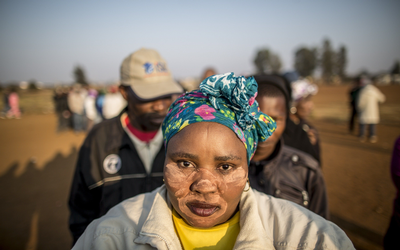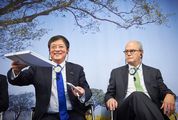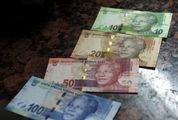Voter turnout win for South Africa
by Staff Writers,
2014-05-08 06:21:20.0
SOUTH Africa’s 20-year-old democracy has reason to celebrate as early indications last night showed an impressive voter turnout in what is considered the country’s most competitive election yet.
While it remained premature to announce the exact extent of the "massive" turnout, Electoral Commission of South Africa (IEC) chairwoman Pansy Tlakula said it had been "extremely high" and had thrown the commission’s plans out of kilter, causing long queues and disruptions in some areas.
A higher voter turnout at Wednesday’s poll could mark a turning point in voter behaviour. From 1999 to 2004, voter apathy had increased from 12% to 23%.
It remained at 23% in 2009, but numerically about 5-million people stayed away from the polls.
More South Africans turning up to vote is punted by analysts as a sign of a healthy democracy and a citizenry that continues to place its hopes and aspirations in the electoral process, despite high levels of often violent protests over service delivery and social unrest.
A high turnout could indicate a stronger performance by the African National Congress (ANC), but could also imply that disgruntled voters who failed to pitch up in the past have had enough, and sought expression at the ballot box. Steven Friedman, director of the Centre for the Study of Democracy at the University of Johannesburg and Rhodes University, said an increase in voter turnout not only belied "the myth of voter apathy" but indicated a more competitive election campaign environment.
The positive note of the day, he said, was that people still valued the democratic process. This held an important lesson — that politicians undervalued voters.
"The turnout underlines the point that many of the service delivery protests take place because people believe they aren’t being listened to. What they are saying is we want more democracy," he said.
This view was supported by the voters in Marikana and Bekkersdal, two hot spots that could have bubbled over on Wednesday. But election day proceeded peacefully, despite a heavy police and military presence in both towns after IEC tents were set alight on Tuesday evening.
For mine workers in Marikana, on Wednesday was as filled with hope as the dawn of democracy in 1994. As in 1994, most voted for change and for what they want most: in this case, a basic wage of R12,500. The party offering that was Julius Malema’s Economic Freedom Fighters (EFF), said Jack Khoba, chairman of the Lonmin Western Plants branch of the Association of Mineworkers and Construction Union.
"People are voting because they want to see change. I think we will see change because with our vote we will show that we will never forget what happened in August 2012."
Mr Khoba was referring to the killing of 43 people in mine-related unrest over wages on the platinum belt near Marikana.
It was a sentiment expressed in many interviews — every vote made a difference and mine workers were queuing for change, they said.
In Bekkersdal, residents queuing early also said they were voting for change. Lenia Gwalasa said she hoped that, after the elections, things would get better. She supported the youth in the area who were raging against the system because they too wanted change.
In the Western Cape, voters in the Cape Town metropole appeared to be voting in the same racial blocs as in the past, with blacks voting predominantly for the ANC and coloureds and whites for the Democratic Alliance. However, newcomer the EFF made its presence felt in the shacklands of Mitchell’s Plain, particularly in Samora Machel and among the youth.
In KwaMashu Hostel, in KwaZulu-Natal, security was tight around voting stations as thousands of hostel dwellers and residents of surrounding informal settlements lined up to cast their votes. Scores of people were shot and killed in the months leading to Wednesday’s poll, and officials were not leaving anything to chance.
Political analyst Aubrey Matshiqi said voter turnout in South Africa still trended much higher than in developed countries, which suggested that a "very high number" of South Africans still believed that solutions to their socioeconomic and other problems could be found through the electoral process.
However, he said, what would be more important to assess was the voter participation rate, which takes into account the size of the eligible voting population. In the past two elections this had trended at about 57%. "When looking at the health of our democracy, it will be important to see if this remains the same."
A more complete picture of the turnout is likely to emerge on Thursday.
Follow the results as they are released here.
Go to our elections 2014 special report for all the news, views and analysis of the elections.

Voters queue in Bekkersdal township in May last year. Picture: AFP
SOUTH Africa’s 20-year-old democracy has reason to celebrate as early indications last night showed an impressive voter turnout in what is considered the country’s most competitive election yet.
While it remained premature to announce the exact extent of the "massive" turnout, Electoral Commission of South Africa (IEC) chairwoman Pansy Tlakula said it had been "extremely high" and had thrown the commission’s plans out of kilter, causing long queues and disruptions in some areas.
A higher voter turnout at Wednesday’s poll could mark a turning point in voter behaviour. From 1999 to 2004, voter apathy had increased from 12% to 23%.
It remained at 23% in 2009, but numerically about 5-million people stayed away from the polls.
More South Africans turning up to vote is punted by analysts as a sign of a healthy democracy and a citizenry that continues to place its hopes and aspirations in the electoral process, despite high levels of often violent protests over service delivery and social unrest.
A high turnout could indicate a stronger performance by the African National Congress (ANC), but could also imply that disgruntled voters who failed to pitch up in the past have had enough, and sought expression at the ballot box. Steven Friedman, director of the Centre for the Study of Democracy at the University of Johannesburg and Rhodes University, said an increase in voter turnout not only belied "the myth of voter apathy" but indicated a more competitive election campaign environment.
The positive note of the day, he said, was that people still valued the democratic process. This held an important lesson — that politicians undervalued voters.
"The turnout underlines the point that many of the service delivery protests take place because people believe they aren’t being listened to. What they are saying is we want more democracy," he said.
This view was supported by the voters in Marikana and Bekkersdal, two hot spots that could have bubbled over on Wednesday. But election day proceeded peacefully, despite a heavy police and military presence in both towns after IEC tents were set alight on Tuesday evening.
For mine workers in Marikana, on Wednesday was as filled with hope as the dawn of democracy in 1994. As in 1994, most voted for change and for what they want most: in this case, a basic wage of R12,500. The party offering that was Julius Malema’s Economic Freedom Fighters (EFF), said Jack Khoba, chairman of the Lonmin Western Plants branch of the Association of Mineworkers and Construction Union.
"People are voting because they want to see change. I think we will see change because with our vote we will show that we will never forget what happened in August 2012."
Mr Khoba was referring to the killing of 43 people in mine-related unrest over wages on the platinum belt near Marikana.
It was a sentiment expressed in many interviews — every vote made a difference and mine workers were queuing for change, they said.
In Bekkersdal, residents queuing early also said they were voting for change. Lenia Gwalasa said she hoped that, after the elections, things would get better. She supported the youth in the area who were raging against the system because they too wanted change.
In the Western Cape, voters in the Cape Town metropole appeared to be voting in the same racial blocs as in the past, with blacks voting predominantly for the ANC and coloureds and whites for the Democratic Alliance. However, newcomer the EFF made its presence felt in the shacklands of Mitchell’s Plain, particularly in Samora Machel and among the youth.
In KwaMashu Hostel, in KwaZulu-Natal, security was tight around voting stations as thousands of hostel dwellers and residents of surrounding informal settlements lined up to cast their votes. Scores of people were shot and killed in the months leading to Wednesday’s poll, and officials were not leaving anything to chance.
Political analyst Aubrey Matshiqi said voter turnout in South Africa still trended much higher than in developed countries, which suggested that a "very high number" of South Africans still believed that solutions to their socioeconomic and other problems could be found through the electoral process.
However, he said, what would be more important to assess was the voter participation rate, which takes into account the size of the eligible voting population. In the past two elections this had trended at about 57%. "When looking at the health of our democracy, it will be important to see if this remains the same."
A more complete picture of the turnout is likely to emerge on Thursday.
Follow the results as they are released here.
Go to our elections 2014 special report for all the news, views and analysis of the elections.













 News, views and analysis of South Africa's national and provincial elections
News, views and analysis of South Africa's national and provincial elections







Change: -0.47%
Change: -0.57%
Change: -1.76%
Change: -0.34%
Change: 0.02%
Data supplied by Profile Data
Change: -1.26%
Change: -0.29%
Change: -0.47%
Change: 0.00%
Change: -0.42%
Data supplied by Profile Data
Change: 1.32%
Change: 1.30%
Change: 0.97%
Change: 0.96%
Change: 1.05%
Data supplied by Profile Data
Change: 0.16%
Change: -0.31%
Change: 0.33%
Change: -1.38%
Change: -2.39%
Data supplied by Profile Data